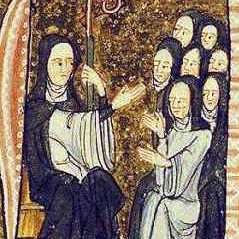 Hoy celebramos la Fiesta de Santa Hildegarda de Bingen. Ella fue abadesa, líder monacal, mística, profetisa, médica, compositora, y escritora. El 7 de octubre de 2012 el Papa Benedicto XVI le otorgó el título de “Doctora de la Iglesia” junto a San Juan de Ávila. Considerada por los especialistas actuales como una de las personalidades más fascinantes y polifacéticas de su edad, se la definió entre las mujeres más influyentes de la Baja Edad Media, entre las figuras más ilustres del monacato femenino, y quizá la que mejor ejemplificó el ideal católico, dotada de una cultura fuera de lo común, comprometida también en la reforma de la Iglesia, y una de las escritoras de mayor producción de su tiempo.
Hoy celebramos la Fiesta de Santa Hildegarda de Bingen. Ella fue abadesa, líder monacal, mística, profetisa, médica, compositora, y escritora. El 7 de octubre de 2012 el Papa Benedicto XVI le otorgó el título de “Doctora de la Iglesia” junto a San Juan de Ávila. Considerada por los especialistas actuales como una de las personalidades más fascinantes y polifacéticas de su edad, se la definió entre las mujeres más influyentes de la Baja Edad Media, entre las figuras más ilustres del monacato femenino, y quizá la que mejor ejemplificó el ideal católico, dotada de una cultura fuera de lo común, comprometida también en la reforma de la Iglesia, y una de las escritoras de mayor producción de su tiempo.
Oremos. “Dios, fuente de vida y de sabiduría que has llenado a Santa Hildegarda de Bingen de espíritu profético. Ayúdanos para que, con su ejemplo, reflexionemos en tus caminos y sigamos tu guía, para que en la oscuridad reconozcamos la luz de tu claridad y estemos en vela para el instante en que tú quieras encontrarnos. Te lo pedimos por Jesucristo Nuestro Señor. Amén.”
***
Like the life of St. Francis of Assisi, St. Hildegard of Bingen’s life was like a harmonious hymn in which she celebrated and praised the Lord of (and in) creation. She had the God-given gift of uniting scientific knowledge and spirituality. During her time, she taught countless people through her writings, her commentaries, her compassionate disposition, and her art. If we allow her, she can still do the same for us.
St. Hildegard was an abbess, composer, pharmacist, writer, and philosopher. She challenged prevailing restrictions on women, breaking with the customs of her time, which prevented women from study and access to libraries. As abbess (leader of a monastic community), she also demanded much the same for her sisters. She learned to sing and compose music, which for her was a means of drawing nearer to God. Music, in her opinion, was not only an art or science; it was also liturgy and worship in the purest sense.
According to Pope Francis (who only this year placed today’s Feast on the Church’s Universal calendar): “In the history of salvation, it was a woman who welcomed God’s Word. Women, too, kept alive the flame of faith in the dark night, awaiting and then proclaiming the Resurrection. Women, like St. Hildegard, find deep and joyful fulfillment in precisely these two acts: welcoming and proclaiming. They are the protagonists of a Church that goes forth, listening and caring for the needs of others, capable of fostering true justice. Listening, reflection, and loving activity: these are the elements of a joy ever renewed and shared with others through feminine insight, the care of creation, the gestation of a more just world, and the creation of a dialogue that respects and values differences.”
Let us pray. “O God, by whose grace your servant St. Hildegard became a burning and shining light in your Church: grant that we also may be aflame with her spirit of love and discipline, and walk before you as children of the light. Through Jesus Christ our Lord, who lives and reigns with you for ever and ever. Amen.”

